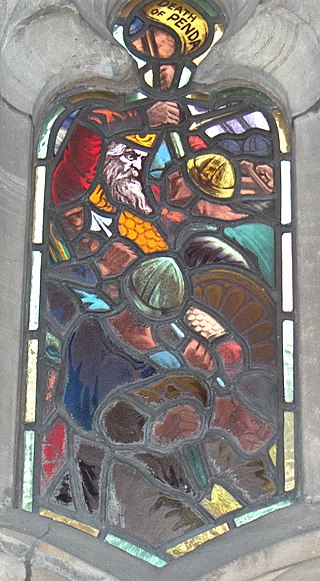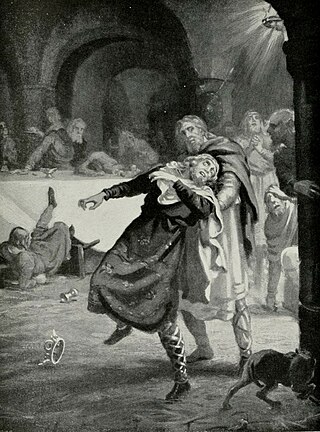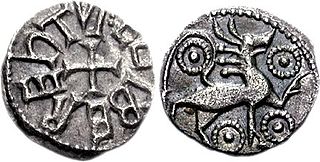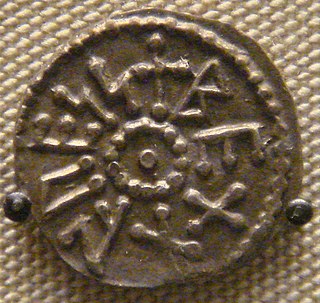Related Research Articles

Bretwalda is an Old English word. The first record comes from the late 9th-century Anglo-Saxon Chronicle. It is given to some of the rulers of Anglo-Saxon kingdoms from the 5th century onwards who had achieved overlordship of some or all of the other Anglo-Saxon kingdoms. It is unclear whether the word dates back to the 5th century and was used by the kings themselves or whether it is a later, 9th-century, invention. The term bretwalda also appears in a 10th-century charter of Æthelstan. The literal meaning of the word is disputed and may translate to either 'wide-ruler' or 'Britain-ruler'.

Year 716 (DCCXVI) was a leap year starting on Wednesday of the Julian calendar, the 716th year of the Common Era (CE) and Anno Domini (AD) designations, the 716th year of the 1st millennium, the 16th year of the 8th century, and the 7th year of the 710s decade. The denomination 716 for this year has been used since the early medieval period, when the Anno Domini calendar era became the prevalent method in Europe for naming years.

Mercia was one of the three main Anglic kingdoms founded after Sub-Roman Britain was settled by Anglo-Saxons in an era called the Heptarchy. It was centred on the River Trent and its tributaries, in a region now known as the Midlands of England.

Offa was King of Mercia, a kingdom of Anglo-Saxon England, from 757 until his death in 796. The son of Thingfrith and a descendant of Eowa, Offa came to the throne after a period of civil war following the assassination of Æthelbald. Offa defeated the other claimant, Beornred. In the early years of Offa's reign, it is likely that he consolidated his control of Midland peoples such as the Hwicce and the Magonsæte. Taking advantage of instability in the kingdom of Kent to establish himself as overlord, Offa also controlled Sussex by 771, though his authority did not remain unchallenged in either territory. In the 780s he extended Mercian Supremacy over most of southern England, allying with Beorhtric of Wessex, who married Offa's daughter Eadburh, and regained complete control of the southeast. He also became the overlord of East Anglia and had King Æthelberht II of East Anglia beheaded in 794, perhaps for rebelling against him.

Æthelbald was the King of Mercia, in what is now the English Midlands from 716 until he was killed in 757. Æthelbald was the son of Alweo and thus a grandson of King Eowa. Æthelbald came to the throne after the death of his cousin, King Ceolred, who had driven him into exile. During his long reign, Mercia became the dominant kingdom of the Anglo-Saxons, and recovered the position of pre-eminence it had enjoyed during the strong reigns of Mercian kings Penda and Wulfhere between about 628 and 675.

Æthelred was king of Mercia from 675 until 704. He was the son of Penda of Mercia and came to the throne in 675, when his brother, Wulfhere of Mercia, died from an illness. Within a year of his accession he invaded Kent, where his armies destroyed the city of Rochester. In 679 he defeated his brother-in-law, Ecgfrith of Northumbria, at the Battle of the Trent: the battle was a major setback for the Northumbrians, and effectively ended their military involvement in English affairs south of the Humber. It also permanently returned the Kingdom of Lindsey to Mercia's possession. However, Æthelred was unable to re-establish his predecessors' domination of southern Britain.

Wulfhere or Wulfar was King of Mercia from 658 until 675 AD. He was the first Christian king of all of Mercia, though it is not known when or how he converted from Anglo-Saxon paganism. His accession marked the end of Oswiu of Northumbria's overlordship of southern England, and Wulfhere extended his influence over much of that region. His campaigns against the West Saxons led to Mercian control of much of the Thames valley. He conquered the Isle of Wight and the Meon valley and gave them to King Æthelwealh of the South Saxons. He also had influence in Surrey, Essex, and Kent. He married Eormenhild, the daughter of King Eorcenberht of Kent.

Penda was a 7th-century king of Mercia, the Anglo-Saxon kingdom in what is today the Midlands. A pagan at a time when Christianity was taking hold in many of the Anglo-Saxon kingdoms, Penda took over the Severn Valley in 628 following the Battle of Cirencester before participating in the defeat of the powerful Northumbrian king Edwin at the Battle of Hatfield Chase in 633.

Coenwulf was the King of Mercia from December 796 until his death in 821. He was a descendant of King Pybba, who ruled Mercia in the early 7th century. He succeeded Ecgfrith, the son of Offa; Ecgfrith only reigned for five months, and Coenwulf ascended the throne in the same year that Offa died. In the early years of Coenwulf's reign he had to deal with a revolt in Kent, which had been under Offa's control. Eadberht Præn returned from exile in Francia to claim the Kentish throne, and Coenwulf was forced to wait for papal support before he could intervene. When Pope Leo III agreed to anathematise Eadberht, Coenwulf invaded and retook the kingdom; Eadberht was taken prisoner, was blinded, and had his hands cut off. Coenwulf also appears to have lost control of the kingdom of East Anglia during the early part of his reign, as an independent coinage appears under King Eadwald. Coenwulf's coinage reappears in 805, indicating that the kingdom was again under Mercian control. Several campaigns of Coenwulf's against the Welsh are recorded, but only one conflict with Northumbria, in 801, though it is likely that Coenwulf continued to support the opponents of the Northumbrian king Eardwulf.
Coenred was king of Mercia from 704 to 709. Mercia was an Anglo-Saxon kingdom in the English Midlands. He was a son of the Mercian king Wulfhere, whose brother Æthelred succeeded to the throne in 675 on Wulfhere's death. In 704, Æthelred abdicated in favour of Coenred to become a monk.

Ceolred was king of Mercia from 709 to 716.

Wiglaf was King of Mercia from 827 to 829 and again from 830 until his death in 839. His ancestry is uncertain: the 820s were a period of dynastic conflict within Mercia and the genealogy of several of the kings of this time is unknown. Wigstan, his grandson, was later recorded as a descendant of Penda of Mercia, so it is possible that Wiglaf was descended from Penda, one of the most powerful seventh-century kings of Mercia.

Eowa was a son of the Mercian king Pybba and a brother of the Mercian king Penda; he was possibly King of Northern Mercia, as the 8th-century Historia Brittonum reports that he was co-ruler with his brother Penda.

The Iclingas were a dynasty of Kings of Mercia during the 7th and 8th centuries, named for Icel or Icil, great-grandson of Offa of Angel, a legendary or semi-legendary figure of the Migration Period who is described as a descendant of the god Woden by the Anglo-Saxon royal genealogies.

Ælfwald was an 8th-century king of East Anglia, an Anglo-Saxon kingdom that today includes the English counties of Norfolk and Suffolk. The last king of the Wuffingas dynasty, Ælfwald succeeded his father Ealdwulf, who had ruled for 49 years. Ælfwald himself ruled for 36 years. Their combined reigns, with barely any record of external military action or internal dynastic strife, represent a long period of peaceful stability for the East Angles. In Ælfwald's time, this was probably owing to a number of factors, including the settled nature of East Anglian ecclesiastical affairs and the prosperity brought through Rhineland commerce with the East Anglian port of Gipeswic. The coinage of Anglo-Saxon sceattas expanded in Ælfwald's time: evidence of East Anglian mints, markets, and industry are suggested where concentrations of such coins have been discovered.

Eadberht was king of Northumbria from 737 or 738 to 758. He was the brother of Ecgbert, Archbishop of York. His reign is seen as a return to the imperial ambitions of seventh-century Northumbria and may represent a period of economic prosperity. He faced internal opposition from rival dynasties and at least two actual or potential rivals were killed during his reign. In 758 he abdicated in favour of his son Oswulf and became a monk at York.

Beonna was King of East Anglia from 749. He is notable for being the first East Anglian king whose coinage included both the ruler's name and his title. The end-date of Beonna's reign is not known, but may have been around 760. It is thought that he shared the kingdom with another ruler called Alberht and possibly with a third man, named Hun. Not all experts agree with these regnal dates, or the nature of his kingship: it has been suggested that he may have ruled alone from around 758.
Cuthwulf, also sometimes Cutha, was the third son of Cuthwine, and consequently a member of the House of Wessex. Although a member of the direct male line from Cynric to Egbert, Cuthwulf was never king. He is said to have been born circa 592, and his death date is unknown.
Events from the 8th century in England.

The Mercian Supremacy was the period of Anglo-Saxon history between c. 716 and c. 825, when the kingdom of Mercia dominated the Anglo-Saxon Heptarchy in England. Sir Frank Stenton apparently coined the phrase, arguing that Offa of Mercia, who ruled 757–796, effectively achieved the unification of England south of the Humber estuary. Scholastic opinion on the relationship between the kingdoms of Wessex and Mercia at this time remains divided.
References
- Kirby, David P. (1991). The earliest English kings. London: Unwin Hyman. ISBN 978-0-04-445691-9.
- Yorke, Barbara (1990). Kings and kingdoms of early Anglo-Saxon England. London: Seaby. ISBN 978-1-85264-027-9.
